What is Play Therapy and how can it help?
Play therapy allows children to explore and express their thoughts, feelings and emotions, helping them make sense of their life experiences through play and creative arts.
While adults often ‘talk out’ their challenges, children find it easier to ‘play out’ what they struggle to articulate with words.
Play therapy is designed to support children dealing with confusing emotions or distressing experiences. Although beneficial for all children, it is especially helpful for those who have difficulty expressing themselves verbally.
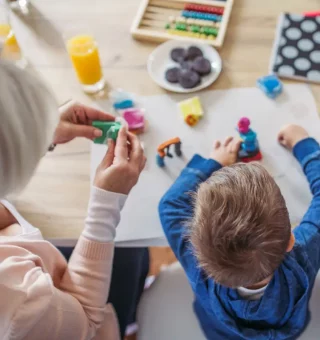
I employ an integrative, holistic, and child-centred approach, allowing the child to lead the play and decide how they address any difficulties or challenges. She uses a blend of directive and non-directive techniques to support the child's journey.
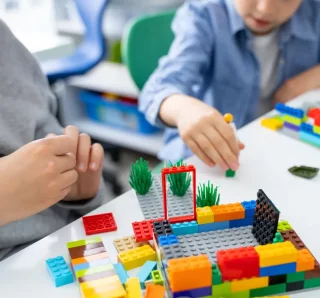
Why use Play Based Therapy
Play is essential for children, as it helps them understand both the world around them and their inner experiences. It plays a crucial role in shaping their learning and development in all areas.
Play is a child's natural form of communication. In a therapeutic setting, guided by an experienced play therapist who provides support, self-regulation, and safety, children can use play to make sense of their experiences.
Research indicates that play, particularly through the use of metaphor, promotes the development of new neural pathways and strengthens existing connections in a child's brain. Engaging in play can positively alter a child's brain structure, especially for those who have faced early trauma or multiple adverse childhood experiences (ACES).

Play therapy can assist children with:
Play therapy can support children with:
- General stress, anxiety, emotional well-being, and self-esteem
- Behavioural challenges
- Attachment difficulties
- Low confidence and self-worth
- Issues with frustration and anger
- Fears and phobias
- Concerns around food and eating habits
- Sleep disturbances and toileting issues
- School-related challenges such as transitioning to new schools or classes, exam anxiety.
- Friendship problems and bullying
- Family issues such as parental separation, divorce, or conflict
- Changes in family dynamics, such as new stepparents, blended families, or new siblings
- Hospital stays and medical treatments
- Coping with loss or bereavement
- Trauma, including experiences of neglect, emotional, physical, or sexual abuse
- Adoption, fostering, or being in care
- The impact of serious accidents, disasters, or PTSD
- Additional behavioural needs such as attention deficit disorder (ADD), attention deficit hyperactivity disorder (ADHD), autism spectrum disorder (ASD), Tourette’s, or similar conditions
How does Play therapy benefit your child?
Play therapy supports children in understanding and processing their experiences. It promotes healing and allows them to develop new thought patterns, ultimately leading to positive behavioural changes.
Through play therapy, children build resilience and coping skills that can be applied to other aspects of their lives and future experiences.
During sessions, children are free to express themselves in whatever way they choose, incorporating their experiences into their play. They can revisit, replay, or reimagine these experiences, exploring how they wish things could be, until they gain a deeper understanding of themselves and their situations.
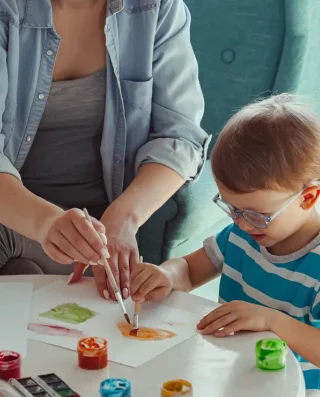
As a therapist, I meet each child where they are in their life’s journey, without any expectations of how they should behave or whether they are on par with others their age. In the playroom, the child is free to be exactly who they need to be at that moment. My role is to create a warm, welcoming environment where they can truly be themselves.
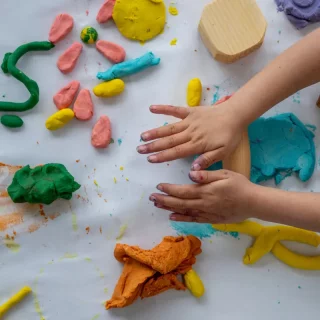
Play Therapy Sessions
What does the process of play therapy include?
Play therapy typically involves one-to-one sessions lasting 40 minutes.
Before starting work with a child, I will meet with the referrer—usually a parent, carer, or school representative—to discuss any concerns about the child. Together, they will review the child’s history, strengths, weaknesses, and any significant challenges they have faced. I may also request permission to speak with teachers or other key adults in the child’s life.
If you decide to proceed, you will sign an initial agreement for 20 weekly sessions with me. Near the end of this period, we will meet again to discuss the next steps in the therapy.
I will also meet with the child, introduce myself and the playroom, answer any questions, and ask the child to complete some assessment activities, such as a drawing and a questionnaire.
Once therapy begins, sessions will take place at the same time and location each week. This consistency is crucial for building a strong therapeutic relationship between me and the child, and missed sessions could disrupt the therapeutic process. Arrangements for holidays and illness will be addressed in the initial meeting.
What to Expect During a Playroom Session
Upon arrival, each child will be warmly welcomed into the playroom. Following a brief introduction to the session, they will have the freedom to choose whether they wish to engage in play or simply observe. This choice is always respected, as some children might prefer to talk or remain still and quiet instead of playing.
The session is entirely child-centred and led by the child. Occasionally, I may suggest a particular activity to support the child in their exploration, but participation is always optional and entirely up to the child.
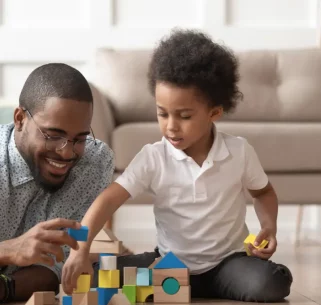
A variety of techniques are available during play therapy, allowing the child to express themselves in the way they feel most comfortable. The playroom offers a wide range of activities, ensuring that every child has plenty of options without the pressure to engage in anything they don't enjoy.
Children may choose to explore many different activities or return to a favourite one each week. They may invite me to join their play, but this is not a requirement.
All forms of play are welcomed, as long as they maintain a safe environment for everyone, and everything involved. Boundaries are only set when necessary to ensure safety.

Some of the techniques a child might explore in the playroom include:
Sand tray play
Small world play (the use of miniatures)
Clay work
Art activities such as painting, drawing, and construction
Dance and movement
Music
Therapeutic storytelling
Creative visualisation
Puppets
Role play
Construction with materials like Lego or Duplo
If a child has specific physical or learning needs, these will be considered, and the playroom activities can be adapted accordingly. For example, a child with sensory sensitivities might prefer softer textures and may avoid activities involving rough or abrasive materials.
In the same way, if certain techniques or environmental factors could cause distress or trigger an emotional response, I can modify the session to create a more comfortable and supportive environment for the child.

Play Therapy FAQs
Play therapy offers a gentle and less daunting way for children to explore their emotions. The therapy toolkit includes a variety of play and creative activities, allowing your child to find the most comfortable method for expressing themselves. Play-based therapy often works through stories and metaphors, providing an indirect approach to processing feelings. Additionally, your child can engage in open dialogue, with the option to use creative mediums to deepen these conversations and enhance their understanding.
The number of sessions needed varies depending on the specific challenges your child is facing. I generally recommend at least 20 sessions to allow sufficient time for meaningful change to occur. Some children may require more sessions. We will review progress every 8 to 10 weeks together (parent, child, and therapist). It’s important that when it’s time to conclude therapy, there are at least four more sessions to provide your child with a secure and well-rounded conclusion to their therapy experience.
Referrals are accepted from parents, carers, schools, GPs, clinical psychologists, and other related professionals. Please get in touch for a free 20 minutes consultation and more information about my services. If you decide to proceed with play therapy after the consultation, we will schedule an initial assessment and information-gathering meeting.
Play therapy requires the consent of both the parents/legal guardians and the child.
Ideally, sessions should take place in a neutral setting rather than at home. It is often possible to arrange sessions at your child’s school, or you can bring them to my private therapy space. A secure, private environment free from interruptions is crucial for your child to feel safe enough to express themselves.
I offer a complimentary 20 minute phone consultation to discuss whether therapy is the right option for your child.
The cost for play therapy sessions is £80 for a 40-minute session. Sessions lasting 60 minutes are £95.
There is a fee for cancellations or missed appointments, so please provide 24 hours' notice where possible. Cancellations within 24 hours or missed sessions may incur a charge.
An initial assessment and consultation meeting costs £100, during which we will discuss the recommended number of play therapy sessions your child may need.
I work closely with parents as part of the service. Although I cannot share specific details of the sessions, I can report on progress and suggest a meeting at the first review and at the end of the therapy. Parents are welcome to contact me with any concerns or questions between sessions.
Any additional meetings or written reports are charged at £95 per hour.
For schools, a range of pricing options is available depending on the type of service required. Please contact me for more details.
Regular weekly sessions are essential, so encouraging your child and ensuring they attend each week is important.
Try not to ask your child too many questions about the sessions; they will share if they want to. A simple, open-ended question like “How was it?” shows interest without putting pressure on them. Avoid asking questions like “Did you have a good time?” as therapy can sometimes bring up challenging emotions, even if it involves play.
Please refrain from telling your child to "be good" before a session, as this might inhibit their ability to express themselves freely out of fear of getting into trouble.
Sometimes behaviour might temporarily worsen before it improves. This can be concerning, but please discuss any worries with me so I can support you in responding appropriately. Open communication helps monitor the impact of the therapy and determine whether additional psychological or psychiatric support might be necessary.
If you have any concerns, please contact me directly rather than asking your child to convey them. It’s important that the child feels free to express themselves at their own pace and in their own way.
Therapy sessions are confidential, so I won’t be able to discuss the specific content. Confidentiality is crucial for the child to build trust with the therapist, which is key to achieving a positive outcome. However, I can use the insights gained to inform any advice and strategies I provide.
If I believe your child or someone they know is at risk of harm, I have a duty of care to share that information with the appropriate authorities. I will inform the child if this is necessary and, wherever possible, discuss my concerns with you first.
Play Therapy UK (PTUK) ensures that therapists on their register follow the procedures required to be registered with the Professional Standards Authority. You can learn more through the links provided below.
Register of Play and Creative Arts Therapists
